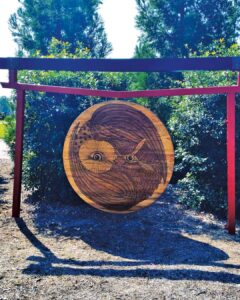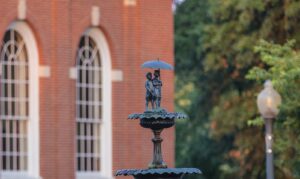Never was more emphasis on creativity in the history of our country than during the Great Depression. Newspapers, magazines, radio commercials, and the like were filled with suggestions of how to apply creativity to your everyday life. You’ve most likely heard of sackcloth dresses or feed sack dresses, of which the author’s grandmother wore and sewed many. No fruit? Let’s make a water pie! No stockings? Let’s paint a seam down the backs of our legs!
A Silver Lining Among the Chaos
The beginning of the Great Depression can be traced to the stock market crash in October of 1929. Over the next decade, unemployment skyrocketed, banks failed, and charity programs became essential in Americans’ lives. To bring folks out of the Depression, newly elected President Franklin D. Roosevelt implemented the New Deal, which was packed with social and economic programs. One of those programs was the Works Progress Administration, which put 8.5 million Americans to work.
For us historians, the WPA is great because the program employed artists, historians, and journalists who created and recorded important historical aspects of the era. As part of the WPA, an artist named Stefan Hirsch was hired to paint a mural of Lady Justice for the Federal Courthouse on Park Avenue in downtown Aiken. Although the mural has been controversial since its debut in 1938, it remains a beautiful artifact of the Great Depression for our area.
Public Improvements
Judging by an article written in the Aiken Standard in 1938, it seems that even politicians were creative in an effort to save their cities. “Mayor Weatherford realized the amount of unemployment early during the depression, and in an effort to build Aiken into a well rounded city, took advantage of the opportunity to secure federal work relief funds for the following meritorious projects: Eustis Park athletic field and grand stand; police barracks; swimming pool; municipal airport; Aiken Club Market; remodeling of city office; sewing room; handicraft; library extension; sanitation; sidewalks; curbs and gutters; storm drainage for the business section of city; and the asphalt surfacing of brick pavement on Laurens Street and Municipal Building, both projects to be begun in November. In 1932, Mayor Weatherford revived the park commission which has been the means of decided improvement to the city parks.”
Talking in Code
There were many areas of life that required a bit of creativity during this time, but none more important than food. Glady Cobb of North Augusta used the code “FHB” with her family when they had visitors over for meals. Meaning “Family Hold Back,” Mrs. Cobb would whisper the letters to signal to her family that portions of the food were running low so they would allow the guests to have as much as they’d like before reaching for seconds. North Augusta itself also endeavored to offer free entertainment for families during the depression, when they would announce in the newspaper that an entire street would be blocked off for roller skating. Most families had only one or two pair of skates, which were shared by the entire family.
Creativity has helped us make it through quarantine and the pandemic as well. From making our own bread to bartering for toilet paper, this trying time in our history has brought the old adage “necessity is the mother of invention” to the forefront. So, if we see you wearing your wife’s bra or your husband’s tube sock as a face mask, we will know that you are just creating history along with us.
Stay creative and curious y’all!
























